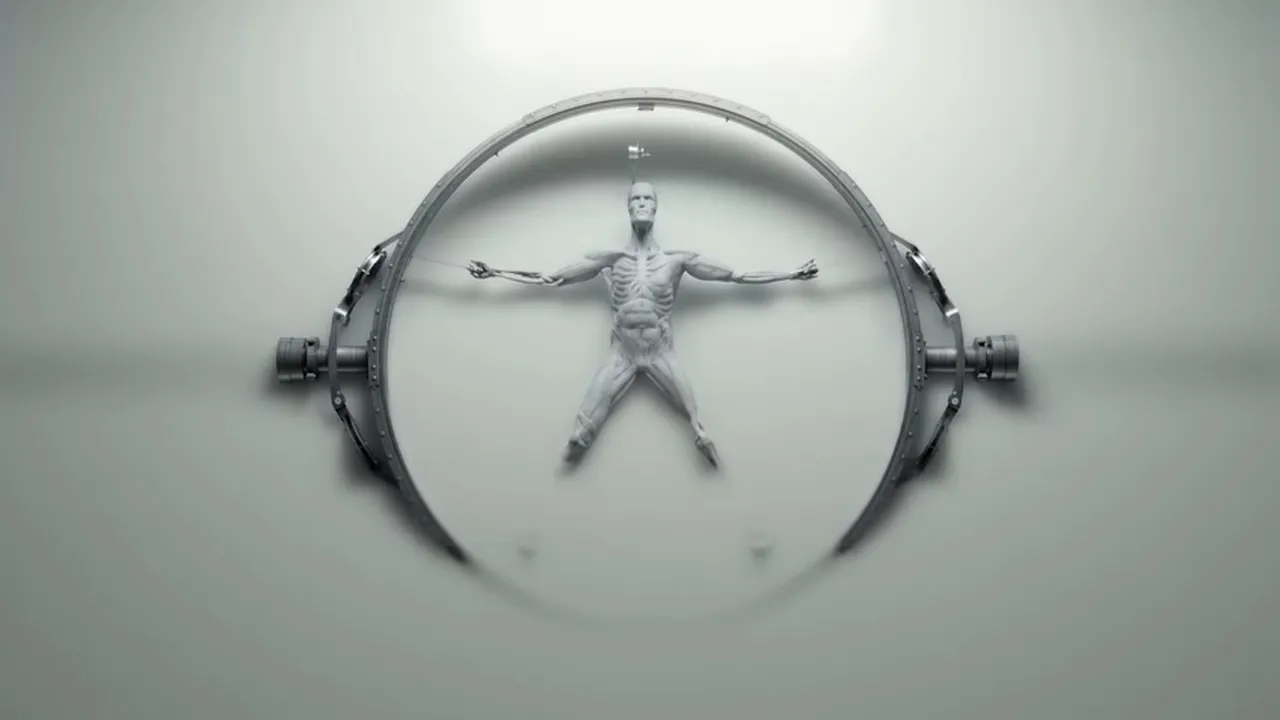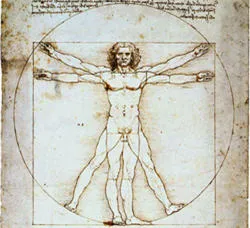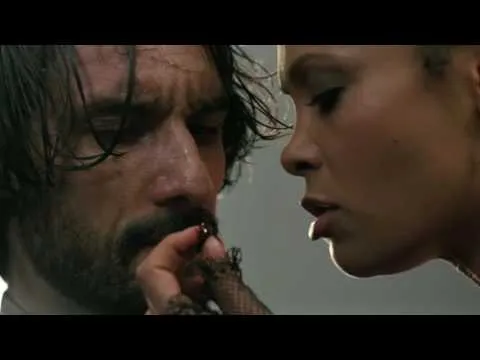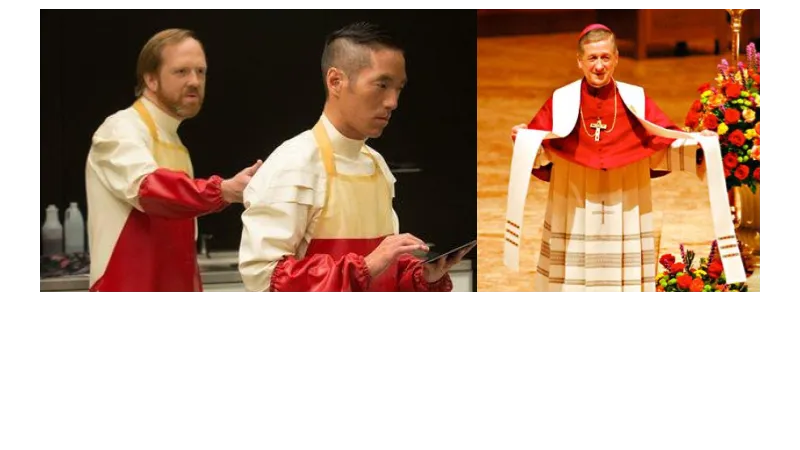
Westworld captivates with its architectural plot and emotional narrative. The mystery of the show is aided by its rich symbolism. There's a lot of fun in the mystery of whether the symbols are intentional or subconscious on part of the show's creators. Da Vinci's Vetruvian Man is one intended symbol; representing the architectural process of designing the park and hosts in their entire complexity.

In the manufacturing sequences, the Vetruvian Man is 'Baptised' in a white substance, making for the first overt mythological reference; a hint that there's a deeper symbolic narrative within plot and character development; its narratives within narratives.
Self-transcendant Artifical Intelligence is the perfect vessel for such thematics.

Maeve and Dolores
I was considering why female characters take center stage in the discovering sentience story arc. The obvious reason is that it's more natural to see a female go through such a range of emotion. Also there are the archetypes they represent. The Fallen Woman and Persephone/Lost Girl.
Dolores: Lost Girl and Persephone
Dolores' backstory is that of the innocent farmer's daughter with the personality to match. Her appearance is constructed to look innocent; blonde, make-up free. Being the first host, she represents the innocent intentions when Arnold and Ford began their ambitious passion project.
Her script has a tragic naivete to it. Something that brings out opposing instincts in the guests; either protect or defile her. A part of her story designed to give a guest the opportunity to rape her or save her from the farm's invaders.
Lost Girl is cliched, an overdone theme in pop-culture. Westworld has a deliberate reference to Alice in Wonderland (the most popular Lost Girl). Despite this, Westworld did transcend cliche to its true archetypal representation, a lot due to the captivating performance of Evan Rachel Wood combined with the depth of her trauma narrative.
No Lost Girl story is complete without having males help her along her journey, and Dolores has many: Ford, Arnold, Bernard, her father Mr. Abernathy, Teddy, William, the MiB. The journey is chaotic and introspective, manifesting the mythological feminine. I never had the feeling I was watching something stereotyped through Dolores' Lost Girl arc. There was a courage and brutality to it that added a 'Hero's Journey' element. Dolores character holds her own and doesn't function as an incomplete female muse that's all too common.
The Persephone myth is a girl lost between two worlds, needed to be rescued by her lover who can't turn to look at her while he leads her out of Hades' Underworld. Of course, he fails just before she escapes, banishing her back to Hades. Dolores' story arc with William shares this tragedy; once he finds her again, he stares at her in dismay to see she's back in her story-loop and no longer recognizes him. William comes to realize that she wasn't free --after all they'd been through together-- and it crushes him. He spends the next 30 years trying to discover himself in the park, lost in the narrative that there's something more for him there. The feminine element of Dolores and the masculine element of William underwent a divisiveness instead of bringing about the transcendent principle through their union (Dolores' awakening accented by Williams' masculine narrative of autonomous self-discovery; left incompleted)
Dolores also enjoys painting naturescapes out by the river where wild horses gather. The connection with nature affirms feminine archetypes and Persephone's relation to the seasons. Her purity of character compliments the serenity of undeveloped natural world. The nature theme's a cruel reminder she is a machine, no matter her cognition. Empathy for AI causes us cognitive dissonance. It's tragic in itself.
Maeve: Fallen Woman and Luciferian freedom
Maeve (Thandie Newton) is a bad bitch at first sight, with some of the wittiest lines in the script. But stoic Maeve started as a protective and self-sacrificing Mother in her former narrative. She is later changed to work as Madame of a brothel (switching from pure Mother archetype to The Venusian/Lover) She becomes the 'fallen woman' symbol, which she shares with Eve of Christian Original Sin. The fallen woman is also a variant of the Persephone myth, fitting her path as parallel to Dolores'. In other ways, Maeve is Dolores polar opposite as she lacks any naivete and innocence in her personality and worldview.
Eve eats the fruit offered by Lucifer the serpent, symbolic of temptation and choosing Free Will over security. Like Lucifer, Maeve only tempts her fellow hosts to wake up, encouraging them into Free Will even when having the power to coerce it.
Maeve's journey shares moments with the rebellious, 'Most-Wanted' criminal Host (Hector). It's another example of masculine parallel to feminine in the awakening arc. The Fighter is the archetypal counterpart to The Lover. Violent Hector embodies this duailty as he's abducted as a sex partner for a Delos' board member and (almost with) a frisky worker.
Hector and Maeve have many romantic moments which blend sex and violence. A symbolic one with Maeve and Hector is when she has him thrust a knife into her to cut out a bullet left in her overnight. She wants Hector to see that there's a bigger picture going on. True to her feistiness, but now awakening, Maeve chooses Hector on her own and not as a prostitute. She also uses sex to lure him to join her path; a type of initiatory rite. Sex as the primal symbol of union of polarities solidifies the symbolism (and adds some sexiness to the show).

What is more of a fantasy than two badasses getting it on while feeling totally free? They do not even fear death as they know they reoccur immortal. They are as eternal as the Lover/Warrior archetypes which make them so appealing.
Maeve herself also embodies aggressive traits of The Warrior. She takes up the Luciferian mission of setting loose a sentient army of hosts, first hearing from rebuilt Bernard that her choices are still part of a 'divine' plan. Maeve is in denial of what Bernard tells her. It's too hard to accept her choices are fated scriptures; the Luciferian paradox.
Rounding out the symbolism, Maeve is assisted by the Westworld workers she once viewed as Gods and Demons. There's also something about their uniforms reminiscent of Catholicism

Maeve blackmails one worker (Felix) using his transgression of having sex with an unconscious host. From this sin, his job is corrupted from its path of service (bad Priest!) Felix eventually embraces his journey with Maeve, becoming a true Apostate. He teaches Maeve her own psychological Alchemy; his skills as a programmer and repairer of hosts suits him to a Magician archetype (often associated with Apostates).
Maeve's finale is assisted by the woman (another Warrior) with the snake tattoo. A diverse symbol in many cultures, the serpent represents both awakening and fear, as the trauma theme in Westworld incorporates. Self-transcendence can't be achieved without suffering and fear.